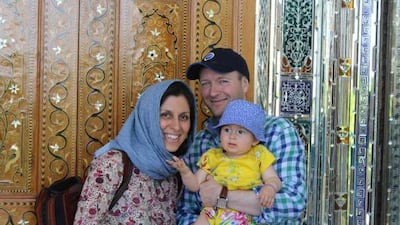Iran has reneged on a promise to allow a British man to visit his jailed wife held in the country’s notorious Evin prison after she became a bargaining chip in a diplomatic battle between London and Tehran, he has told the National.
Richard Ratcliffe said he had received no response from the Iranian authorities after he travelled to New York in September and a letter was hand-delivered to the country’s foreign minister Javad Zarif who was attending the United Nations General Assembly.
Mr Ratcliffe, a Briton, has not seen his family, other than through Skype calls with his daughter, since the arrest and detention of his wife Nazanin Zaghari-Ratcliffe in April 2016.
She held at Tehran’s airport as she prepared to fly back to Britain with her two-year-old daughter Gabriella after a two-week holiday to see her parents.
She has been accused in the Iranian media of plotting the “soft overthrow” of the regime and has suffered from depression, physical problems and endured months in solitary confinement.
Mr Ratcliffe’s attempts to secure a visa to see her have been repeatedly rebuffed despite promises made by the Iranian authorities via media outlets, he said in an interview.
Mr Ratcliffe said that he received only two responses from the Iranians. On the first occasion, he was offered a meeting after he held a birthday party for his daughter – who remains in Iran with his wife’s parents - outside the Iranian embassy in London. The meeting was later cancelled. On the second, he was told he had not filled out the right forms for a visa application.
“From all the contact I’ve had with the Iranians, it’s almost entirely been one way,” he said. “From a point of basic accountability it’s extraordinary that you can hold someone’s wife for a year and a bit… and they’re not willing to talk.”
_____________
Read more:
UK foreign secretary shrugs off resignation call after Iran blunder
Charity worker faces 16 more years in Iranian jail over ‘farcical’ national security charges
_____________
Mr Ratcliffe also rejected claims by the UK government that his vocal campaign to free his wife was harming his family. He also accused the British officials of failing to protect his wife.
“It’s egregious what is happening. Her treatment is akin to torture – it meets all the legal definitions - yet the UK government is not prepared to criticise her treatment. That is quite striking when you see it for the first time…. I don’t think she is being protected and I have made that clear.”
He has promised his wife that he would bring her and her daughter back to Britain by the end of next month but his campaign has received several setbacks with fresh allegations of espionage levelled against her in the last month – just as she became eligible for early release.
In the latest setback, Boris Johnson, the foreign secretary, blundered while giving evidence to MPs last week, suggesting that she had been in the country to train journalists, a claim seized on by the Iranian authorities to claim she had been plotting to bring down the regime.
Her employer, the Thomson Reuters Foundation, and her supporters say that she was merely visiting her family. Her arrest follows the pattern of dual nationals arrested in Iran in 2016 following the signing of the nuclear deal with the United States.
“One thing you learn if you grow up in Iran is where the red lines that you don’t cross. If you do cross it then you can expect all sorts of things to happen,” Mr Ratcliffe said. “That’s why none of the other families talk out because that is a red line. I’m a foreign husband I can call it as I see it.
“We’ve campaigned quite vocally compared to the other families… one of the questions I would always ask – am I jeopardising her by being so public? It’s a fair question. The [former foreign office] minister Tobias Ellwood put it to me that you are harming your family by campaigning, which was hard to hear – and I don’t think true.”
He said it was nonsense to suggest that she was involved in anti-Iranian activity. “Try taking a two-year-old shopping and see how easy that is, let alone orchestrating a big overthrow of the regime,” he said.
He does admit that as time has gone on, his campaign has been a “lesson in the limitations of my power as an individual citizen” to persuade his government with a web of competing geopolitical and trade interests to focus on the plight of his wife.
He describes it as a harsh introduction to “grown-up politics” between the UK and the “brazen bargainers” of Iran.
In comments to parliament this week, Mr Johnson faced down calls for his resignation but admitted he could have been clearer with his comments about the reasons Ms Zaghari-Ratcliffe was in Iran.
He said that he would seek to visit her in prison when he travels Iran in the next few weeks.
“The past two days have shone a light on the fact that the government is no standing up for her,” Mr Ratcliffe wrote in a piece for the Times on Wednesday. “This week was a mess but we are hoping some good comes out of it. We have suffered through 600 days. We don’t want to suffer 600 more.”
The Iranian embassy in London did not respond to a request for comment.


